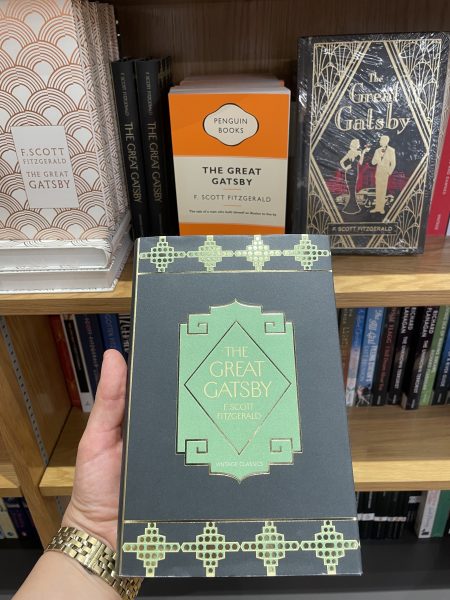
" The Great Gatsby "
I became acquainted with this novel in the book “Norwegian Wood,” and shortly after in Shahin Kelanteri’s writing workshop. My eagerness to read this book, like other novels I’m currently engrossed in, stems from immersing myself in all dimensions of existence through the stories, particularly those crafted by seasoned writers. The stories satisfy my endless enthusiasm for learning and the inner child’s need for entertainment and playfulness in the sweetest possible way. These days, I’m also writing a little alongside my reading. What I see in my writing ability today is merely focusing on describing my experiences of tasting the freshness and coolness of learning. Perhaps in the future, with deeper access to the sea within me, I will take steps beyond and recount other dimensions of this life experience in the world of stories.
“The Great Gatsby” had beautiful, detailed, and poetic descriptions, along with words waiting to be said, but until page 225, my hand didn’t reach for writing them. Most likely, I still didn’t have the experience and understanding of them in real life. Whenever I hear or read something that reflects an experience from my past, I quickly pick up a pen as if the writer has elegantly penned down my lived experiences in these lines.
“I couldn’t forgive him or like him, but I saw that what he had done was, to him, entirely justified. It was all very careless and confused. They were careless people, Tom and Daisy – they smashed up things and creatures and then retreated back into their money or their vast carelessness, or whatever it was that kept them together, and let other people clean up the mess they had made …
I shook hands with him; it seemed silly not to, for I felt suddenly as though I were talking to a child. Then he went into the jewelry store to buy a pearl necklace – or perhaps only a pair of cuff buttons – rid of my provincial squeamishness forever.”
These moments and behaviors are so familiar to me. I have met many people in this small and carefree world. I have realized the confused and bewildered state of the narrator in these lines in those moments with all my soul.
Individuals who, with their rightful or wrongful actions, knowingly or unknowingly, have toyed with the lives of others, perhaps even leading to their destruction, and with the same disturbing nonchalance, have justified their deeds with what seems like sincere reasoning.
Those who, with their rightful or wrongful actions, willingly or unwillingly, toyed with the lives of others, perhaps even leading to their destruction, and with the same disheartening nonchalance, justified their deeds. The state of perplexity that one experiences internally, and the depth and extent of absurdity observed when dealing with these individuals in such situations are indescribable. In the inner courtroom, the struggle to judge these individuals and the circumstances that arise, and most importantly, the decision on how to behave and interact with them, seems endless.
At least until today, I haven’t been able to find a moderate and less damaging approach. In situations where we are directly affected by such behaviors, it is clear what we should do and the decision on how to react becomes more justified. The problem arises when individuals with such behavior not only directly harm one or more other individuals but also cause the destruction of noble morals and ethical behavior, and, in general, the moral and humane collapse of a society. This leads to people gradually regretting their righteous and responsible behavior and leading them to adopt a more carefree and irresponsible approach to life. My lived experience has taught me that here, my response as a member of a morally crumbling society is neither silence nor passivity; because although currently I am only indirectly affected by such behavior, in the future, it is highly likely that I will be directly affected by such actions.
Firm and unequivocal opposition to such behaviors acts as a barrier against irresponsibility and selfishness, asserting the right and authoritative position against the tyrannical and self-serving actions of these individuals. This method of response, at the very least, leads to isolating such individuals or preventing them from openly and recklessly expressing their self-serving and harmful attitudes toward others. The fact that these individuals try to occasionally monitor their behavior and, as the narrator of “The Great Gatsby” puts it, not let them “smash up things and creatures and then retreat back into their money or their vast carelessness, …”, but instead take responsibility and clean up their mess, will be a progressive and impactful step towards the betterment of society.


